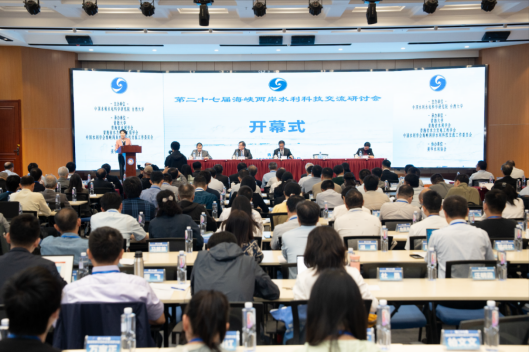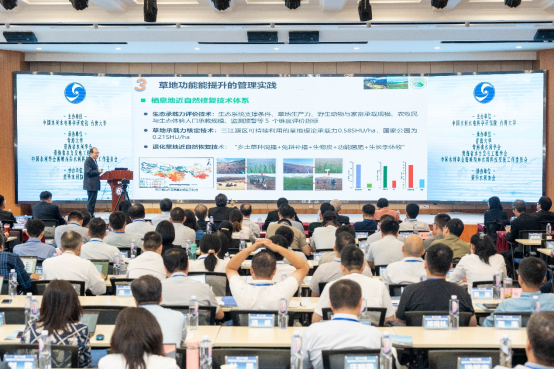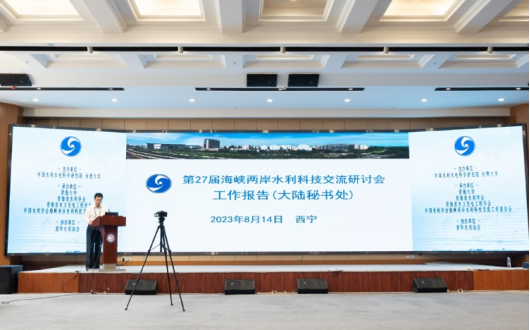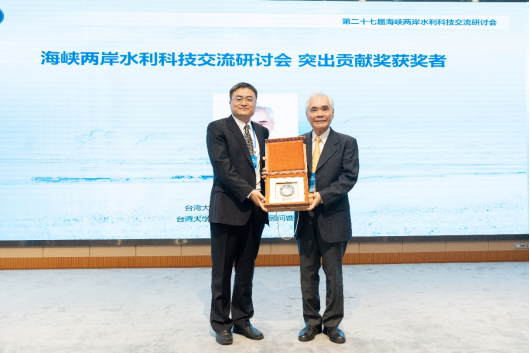On August 14, 2023, under the guidance of
the Taiwan Affairs Office of the State Council and the Ministry of Water
Resources, the 27th Cross-Strait Symposium on Water Conservancy Science and
Technology Exchange (hereinafter referred to as the "Cross-Strait
Symposium") opened in Xining, Qinghai Province. Hosted by the China
Institute of Water Resources and Hydropower Research (IWHR) and National Taiwan
University, co-organized by the Sino-American Water Resources Association, and
undertaken by Qinghai University, Qinghai Provincial Hydraulic Engineering
Society, Qinghai Provincial Hydropower Engineering Society, and the
Cross-Strait Water Conservancy Science and Technology Exchange Working
Committee of the Chinese Hydraulic Engineering Society, this symposium brought
together over 200 participants. Prof. Zhong Zhiyu, Chief Engineer of the
Ministry of Water Resources; Prof. Peng Jing, President, Secretary of the Party
Committee of IWHR and Director-General of the IRTCES; Prof. Zhang Cangrong,
Professor of National Taiwan University; and Prof Li Lirong, Secretary of the Party
Committee of Qinghai University, attended the opening ceremony and delivered
speeches. Prof. Ding Liuqian, Vice President of IWHR, presided over the keynote
report session of the opening ceremony. The five-day symposium gathered
representatives from water conservancy authorities, river basin institutions,
local water resources departments, research institutions, academic societies,
universities, and enterprises from both sides of the Taiwan Strait and the
Chinese American Water Resources Associationn.

Opening
Ceremony
Prof. Zhong Zhiyu stated, "When the
country is prosperous and the nation thrives, compatriots on both sides of the
Taiwan Strait will enjoy a better life." The Cross-Strait Symposium on
Water Conservancy Science and Technology Exchange has gone through nearly 30
years, with its scale of exchange expanding, influence growing, and young
talents emerging continuously. It has become a precious and important brand
event in the water conservancy circles on both sides of the Strait. The water
conservancy construction and technological development in the Chinese mainland
and Taiwan region each have their own characteristics. It is necessary to
strengthen exchanges and cooperation in water conservancy science and
technology, promote mutual learning, enhance the technological level and
innovation capability on both sides, jointly respond to new challenges in water
governance in the new era, and jointly promote high-quality development of
water conservancy.
Prof. Peng Jing noted that at different
stages of development, the Cross-Strait Symposium has always closely aligned
with the hotspots and focal points of water conservancy development on both
sides of the Strait, tracked new concepts, new technologies, and new methods,
and has been widely recognized by water conservancy science and technology
colleagues on both sides. Looking to the future, the symposium should continue
to focus on hot issues in water conservancy development, constantly optimize
topic settings, enrich research contents, encourage extensive participation of
water conservancy experts and young people from both sides, promote the
inheritance, development and innovation of water conservancy science and
technology across the Strait, and gather wisdom from all parties to provide
stronger support for high-quality water conservancy development in the new
stage.
Prof. Zhang Cangrong said that Taiwan
region has experienced alternating droughts and floods this year, going through
high-temperature weather and rainstorms and floods caused by typhoons. Under
the background of climate change, both sides of the Strait are facing common
water challenges, and he hopes that academic exchanges between the two sides
will be further strengthened.
Prof. Li Lirong stated that water
conservancy is related to the national economy and people's livelihood, is a
major force for benefiting the people's wellbeing, and is a focus of common
concern for people on both sides of the Strait. She expects that this seminar
will provide new ideas and directions for the innovative development of water
conservancy science and technology across the Strait.

Keynote
speetch
This symposium, focusing on the
water-related issues commonly faced by both sides of the Taiwan Strait under
the current climate change situation, included sessions such as keynote reports,
parallel session exchanges, and a special session for the selection of
outstanding youth papers. Prof. Zhao Xinquan, Director of the State Key
Laboratory of Plateau Ecology and Agriculture, Mr. Chen Shenxian, Chairman of
Chung Hsing Engineering Consultants Group, and Prof. Lian Yanqing, Former
President of the Sino-American Water Resources Association and Professor at the
University of Illinois, delivered keynote reports respectively, with the titles
"Scientific Issues and Practices in Synergistically Enhancing the
Multifunctionality of Alpine Grasslands", "Water Resources Strategies
in Taiwan Region Under Climate Change" and "Development and
Application of Coupled Hydrological and Hydrodynamic Simulation Models".
The keynote reports were hosted by Prof. Ding Liuqian, Vice President of the
China Institute of Water Resources and Hydropower Research.
The parallel session exchanges covered
five themes: "Water Resources Management and Agricultural Water
Conservancy", "Water Engineering Safety and Disaster Prevention and
Mitigation", "Soil and Water Conservation and River Governance",
"Water Environment and Water Ecology", and "Water Conservancy
Information Technology and Others". Experts from both sides of the Taiwan
Strait shared cutting-edge theories, strategies, methods, and practices in
their respective fields. The special session for the selection of outstanding
youth papers gathered 20 young scholars from both sides, who delivered reports
and exchanged ideas on topics such as flood control technologies and practices
across the Strait, river and reservoir governance, and smart water
conservancy-related technologies and applications.

Introduction
to the Work of the Mainland Secretariat
During the conference, a joint meeting of
the Organizing Committee and the Academic Committee was held. The meeting was
chaired by Prof. Peng Jing, President of IWHR and Director-General of the IRTCES.
Prof. Ding Liuqian, Vice President of IWHR, together with nearly 60 committee
members from river basin institutions, local water resources departments,
research institutions, universities, academic societies and enterprises,
attended the meeting and conducted discussions. Prof. Zhang Jianli, Deputy
Director of the IRTCES, introduced the work of the Mainland Secretariat for this
symposium.

Presentation
of the Strait Exchange Symposium Outstanding Contribution Awards
At the closing ceremony, Prof. Ding
Liuqian, Vice President of the China Institute of Water Resources and
Hydropower Research, Prof. Zhang Cangrong from National Taiwan University, and Prof.
Ma Jun, Vice President of Qinghai University, presented awards to the winners
of the first, second, and third prizes for outstanding youth papers,
respectively. Ding Liuqian and Zhang Cangrong presented the "Outstanding
Contribution Awards" to recipients from both sides of the Strait. In their
closing speeches, Ding Liuqian and Zhang Cangrong summarized the current
symposium and looked ahead to future development. Finally, Dalian University of
Technology delivered a presentation on hosting the 28th Cross-Strait Symposium
on Water Conservancy Science and Technology Exchange. The closing ceremony was
hosted by Zhang Jianli, Deputy Director of the IRTCES.

